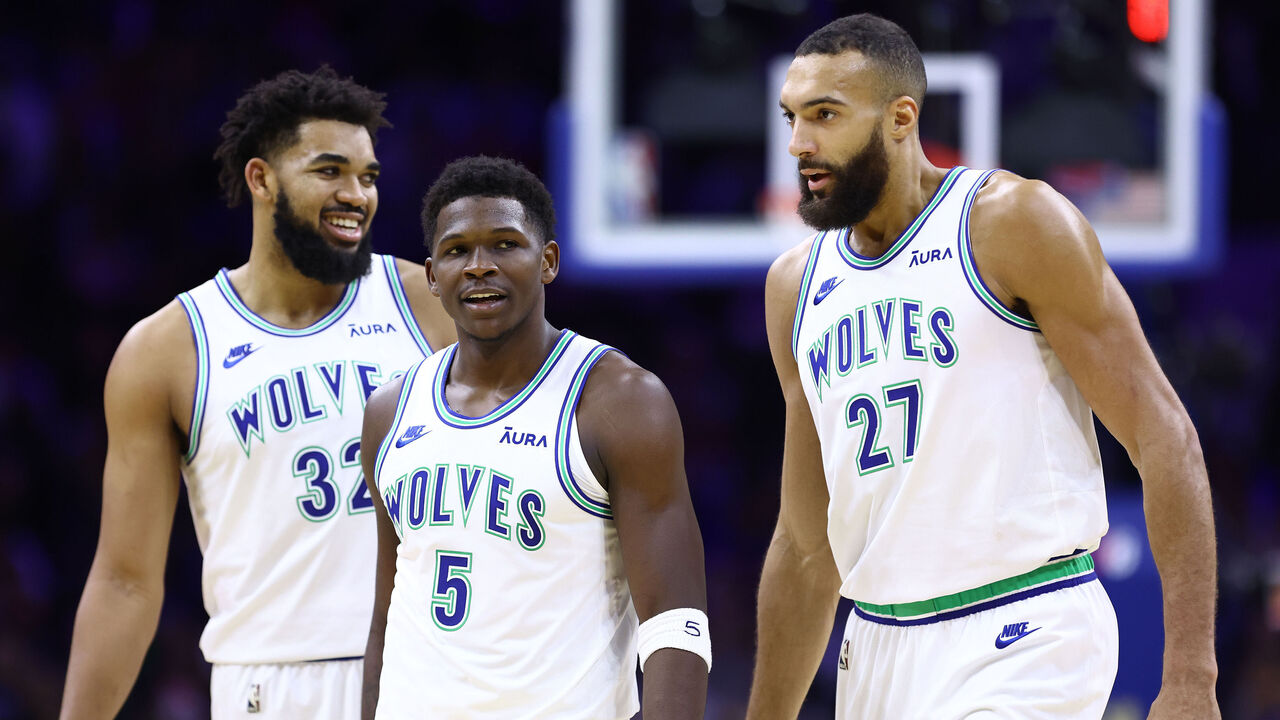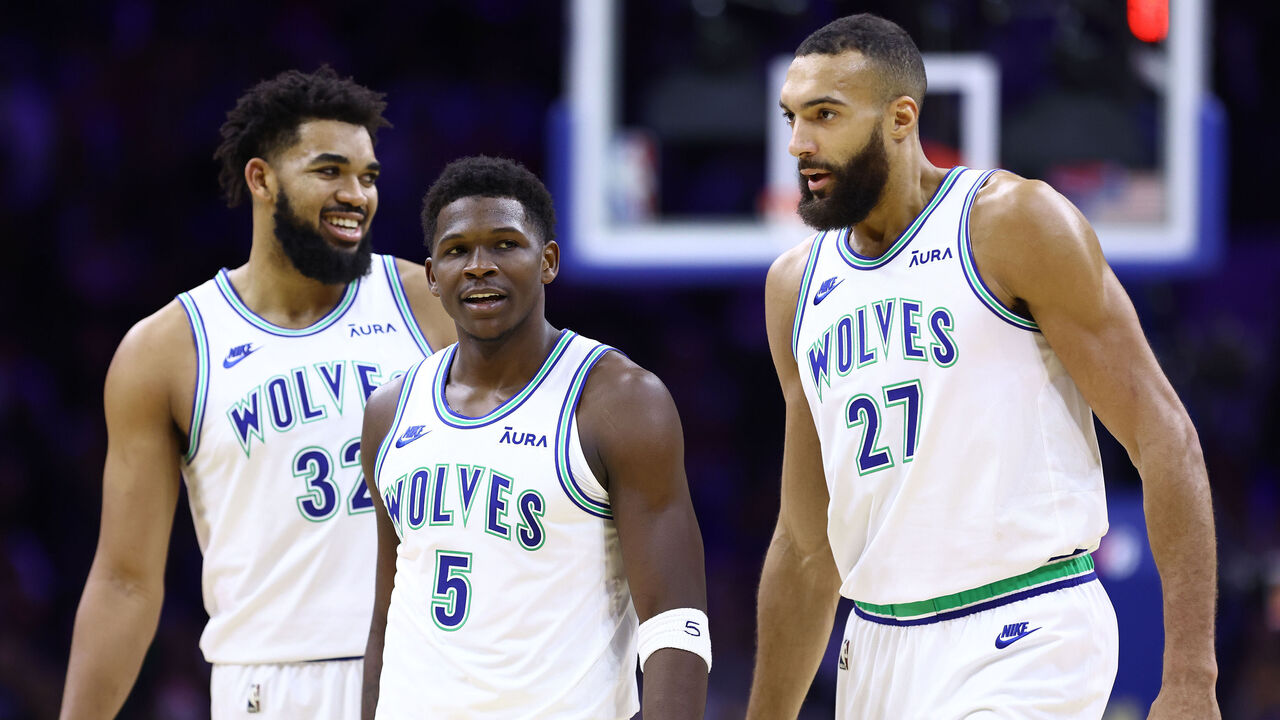Beating Nuggets is a coming of age for Ant's T-Wolves
The easiest conclusion to draw from the Timberwolves’ stunning defeat of the Nuggets is that Anthony Edwards has officially arrived – that eliminating the defending champions represents a coming of age for the 22-year-old superstar whose postseason exploits have defined this spring’s changing of the guard in the NBA.
But Minnesota’s Game 7 victory was about so much more than that, and it took much more than Edwards to achieve.
Karl-Anthony Towns, who thrived all year in a more secondary role, exorcised many of his postseason demons. Sure, some of those ghosts reappeared in Games 3 and 4 of the second-round series, when Towns fell victim to erratic decision-making and shot selection. But the big man erased those memories in Game 7 when he overcame foul trouble – another of his playoff boogeymen – and was the best Timberwolf on the court in the franchise’s biggest game in two decades.
Towns brought it on both ends. Though he struggled from distance, a 7-of-8 performance inside the arc fueled a 23-point, 12-rebound showing in which he more decisively and aggressively attacked mismatches. His most admirable work came on defense, where Towns bodied up Nikola Jokic and helped wear the big fella down.
When Towns ran into foul trouble, in came Sixth Man of the Year Naz Reid. As always, Reid more than held the fort. Alongside one of Towns or Reid, Defensive Player of the Year Rudy Gobert put in plenty of his own work on Jokic. Gobert anchored the back line, bringing perfectly timed help and protecting the rim – where Denver converted at a ghastly 48% clip, according to Cleaning the Glass.
Despite the predictable knocks Gobert took after Jokic’s Game 5 masterpiece, the final two games of the series offered a more accurate representation of what Gobert’s been for Minnesota: the linchpin of the league’s best defense by a country mile.
When Gobert fouled out with 2:05 remaining, Towns returned to finish the job. That three-headed frontcourt monster of Towns, Gobert, and Reid – combined with Edwards’ shotmaking and demeanor, Jaden McDaniels’ defensive brilliance, and Mike Conley’s caretaking – made Minnesota uniquely equipped to beat Jokic’s Nuggets. Just ask the three-time MVP himself.
The Nuggets were only held to 90 points or fewer six times this season (regular season & playoffs).
Four of those games came against Minnesota—three in this series. ? pic.twitter.com/AvZ4fDhpZC
— Stathead (@Stathead) May 20, 2024
The twist in this rivalry is that the man who built the team best suited to beat Denver is the same man who constructed the reigning champion. It’s no mystery, then, why a wayward team like the Pistons would be so interested in hiring Timberwolves president Tim Connelly in hopes that his Midas touch might transform their woebegone franchise.
The Timberwolves were once in that same boat. Between 2005 and 2023, Minnesota won four total playoff games across three postseason appearances. This season marks just the second time in the franchise’s 35-year history that the team advanced past the first round. Last year, their hopes were dashed by infighting and literally self-inflicted wounds. Not anymore. The old narratives about this team, about Towns, about Gobert – about all of them – are dead.
That’s what happens when you notch a postseason victory as unfathomably impressive as Minnesota just did. Facing elimination against the best player in the world and the defending champs, the Wolves responded with the eighth-largest victory in playoff history in Game 6, then rallied from a 20-point deficit in the second half of Game 7.
No team had ever even come back from 12 down at halftime of a Game 7. Minnesota did that and then some, on the road, in the mile-high altitude, against a team that was 8-2 in playoff series when Jokic and Jamal Murray were both in the lineup. The Wolves flat-out took it from them, finishing the contest and the series on a 60-32 run over the final 22 minutes.
Just as Towns and Gobert did individually, the franchise itself did a lot of growing up Sunday.

Of course, Edwards is still at the core of it all, both in the big picture and within the context of Game 7.
Though his scoring and efficiency waned over the final three games of the series, capped by a woeful shooting performance Sunday, Edwards didn’t allow himself to become a passenger. His defensive work on Murray in the second half, his continued aggressiveness on the offensive end, and his playmaking sparked the comeback.
The Timberwolves never have to worry about Edwards getting gun-shy. It’s not in his DNA, and that unflappable attitude has permeated a franchise that used to shrink under the brightest lights.
Still, despite this mammoth step forward for Edwards and the Timberwolves, there’s more work to be done. With home-court advantage in the Western Conference final, and a potential Finals matchup against a top-seeded Celtics team that hasn’t quite hit its postseason stride, Minnesota is staring down the franchise’s most realistic shot at a championship.
Too often, teams in the Wolves’ position find out that their first real crack at a title was also their best and last chance. That’s especially true in an era of nearly unprecedented parity, not to mention this new era of the second tax apron. Minnesota is built to win right now and ready to do it. The Timberwolves shouldn’t be satisfied, and Edwards would never let them be.
There’s the irony: For this franchise to finally grow up, and for veteran stars like Towns and Gobert to silence their doubters, it took a 22-year-old who refuses to accept anything less than top billing.
Joseph Casciaro is theScore’s senior content producer.


